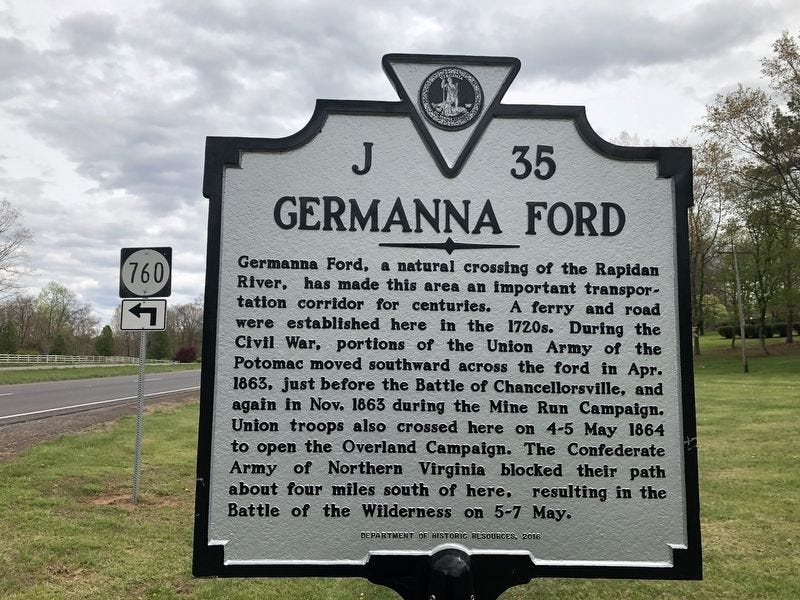The German Protestants who came in 1714 were, in fact, the "First Settlers" of Orange County, Virginia, then a part of Essex, afterward of Spotsylvania.*
Three German colonies came to Virginia during Governor Spotswood's administration and settled at or near Germanna.
The first colonists consisted of twelve families, numbering forty-two persons, as shown by the order of the Virginia Council passed on April 28, 1714, which provided that a fort should be built, two cannons furnished, and a road cleared to the settlement.
Mr. Charles E. Kemper, of Staunton, Virginia, a lineal descendant of one of the families, in an article contributed to the April number, 1906 of the Virginia Magazine of History and Biography (Vol. XIII., pp. 367-70), provided the names of the first German settlers as follows:
Jacob Holtzclaw, wife Margaret, sons John and Henry; John Kemper, wife Alice Kathrina; John Joseph Martin, wife Maria Kathrina; John Spillman, wife Mary; Herman Fishback, wife Kathrina; John Henry Hoffman, wife Kathrina; Joseph Coons, wife Kathrina, son John Annalis, daughter Kathrina; John Fishback, wife Agnes; Jacob Rector, wife Elizabeth, son John; Melchior Brumback, wife Elizabeth; Tillman Weaver, mother Ann Weaver; Peter Hitt, wife Elizabeth. In 1724, these Germans were proving their importations in the Spotsylvania County Court to take up lands under the Head-right Act and stated that they had arrived in Virginia in April 1714.
All these first colonists belonged to the German Reformed Church and were natives of the old principality of Nassau-Siegen, now part of Westphalia, Germany. Their homes were situated near the cities of Siegen and Muesen.
Baron de Graffenreid, acting for Governor Spotswood, persuaded the first pioneers to leave their homes in Germany. At that time, the governor was preparing to develop his iron mines near Germanna. This business enterprise of the governor was the sole cause of their coming to America and Virginia.
It was this first group of migrants who organized the German Reformed church in the United States at Germanna. John Fontaine recorded in his Journal the first description of a religious service in America conducted by the adherents of this denomination. They were removed from Germanna in 1721 and settled on Licking Run, about eight miles south of Warrenton near Midland station, where they first acquired lands. (The locality was then in Stafford, later Prince William, and is now Fauquier County). Their new home was known as Germantown. Rev. Henry Haeger was their pastor who died in 1737.
The second German colony arrived in 1717. Although its destination was Pennsylvania, not Virginia, it reached Virginia through circumstances for which it was not responsible and which it could not control.
This colony was chiefly composed of Lutherans. It numbered about eighty people and consisted of twenty families, coming from Alsace, the Palatinate, and adjacent districts in Germany.
In 1719, a third colony, also mostly Lutherans, consisting of forty families, came to Virginia and settled near Germanna. Comparatively, nothing is known about the antecedent history of this last group of Germans. The colony of 1717 became involved in litigation with Governor Spotswood, of whose treatment they more than once complained.
The records of Spotsylvania show their names as follows: John Broil, Frederick Cobbler, Christopher Zimmerman, wife Elizabeth, children John and Andrew; Henry Snyder, wife Dorothy; Michael Smith, wife Kathrina; Michael Cook, wife Mary; Andrew Kerker, wife Margarita, daughter Barbara; William Carpenter, wife Elizabeth; Christopher Pavler, (or Parlur) wife Pauera; Jacob Broil; John Broil, wife Ursley, children Conrad and Elizabeth; Nicholas Yeager, wife Mary, children Adam and Mary; Philip Paulitz; Robert Turner, wife Mary, children Christopher, Christianna, Kathrina, Mary, and Parva; Conrad Auberge, Balthasar Blankenbaker, Michael Clore, Andrew Ballenger, George Sheible, George Meyer, Michael Kaffer, Matthias Blankenbaker, Michael Holt, Zerechias Fleshman, Hendrick Snyder, George Utz.
Quite a number of them proved their importations at Germanna in 1726 and 1727, and their names are given in the Virginia Magazine of History and Biography, April No.,1906.
_*Note_Acts of Assembly passed in the Colony of Virginia from 1662 to 1715," printed in London in 1727. The last Act in this series is one that exempts certain German Protestants from the payment of levies for seven years and for erecting the parish of St. George, passed in 1714: "Whereas certain German protestants, to the number of forty-two persons or thereabouts, have been settled above the falls of the River Rappahannock, on the southern branch of the said river, called Rapidan. at a place named Germanna, in the County of Essex, and have there begun to build and make improvements for their cohabitation.
__________________________________________________________________________
Sources: A History of Orange County, Virginia From its Formation in 1734 (O. S.) to the end of Reconstruction in 1870; compiled mainly from Original Records With a Brief Sketch of the Beginnings of Virginia, a Summary of Local Events to 1907, and a Map By W. W. Scott, State Law Librarian, Member of the State Historical Society, and for ten years State Librarian of Virginia.
Orange County Wills, Estates, Marriages




